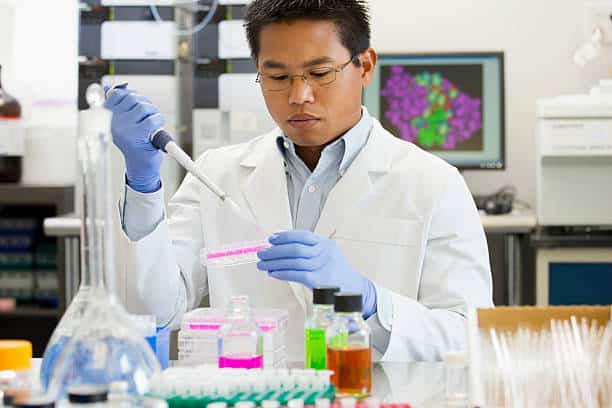Table of Contents
To become a practicing pharmacologist, you need to first earn a pharmacology degree. In this study, we will be discussing what a pharmacologist is, the work they do, how long does it take to become a pharmacologist, and how to get a degree in pharmacology.
We will also try to clear the misconceptions most people have about a pharmacologist being the same as a pharmacist.
What is pharmacology?
Pharmacologists study the effects of drugs and other chemicals on humans. They also study the effects on animals and plants.
This is so that they will know how humans, plants, or animals as the case may be, respond to these drugs or chemicals to determine which one is beneficial, which is harmful, which cures what, which combination will lead to what.
The pharmacologist plays a very vital role in the medical industry. Without them, people will keep having adverse reactions to drugs and chemicals that are fatal without even knowing that these drugs and chemicals are the reason for such reactions. Also, people will be unaware of the reactions between drugs and other substances.
The leaflets found inside drug packs usually contain a section where the effects of the drugs, possible reactions, contraindications, people who should not take the drugs are written. This is to help people have the needed information about the drugs. This is made possible as a result of the work done by the pharmacologist.
They work in laboratories with other scientists to produce new drugs and test them to ensure they are safe for distribution. This is the work of a pharmacologist. They work in labs. You will not find them working in hospitals or other health care centers.
Duties of a pharmacologist.
The duties of pharmacologist centers around the creation of safe drugs for consumption. They include:
- They identify what substances can be used to make drugs
- They test drugs to ensure they are safe and effective for treating the diseases they were made to cure.
- They test various substances and chemicals to determine if they are safe for consumption.
- They conduct drug research and test drugs on plants, animals, and even humans.
Differences between a pharmacist and a pharmacologist
Most people do not realize there is a difference between a pharmacist and a pharmacologist. This is because both careers are in the same field and they are quite similar. Here, we will be looking at the differences between them.
We have discussed who a pharmacologist is, we will now talk about who a pharmacist is to enable get a clear picture of the two careers before going into the differences proper.
A pharmacist is usually the person most people come into contact with. This is because they come in contact with patients directly to enable them to educate the buyer of the drug about things dey needs to know. They prescribe drugs and give medical advice. They usually work in hospitals and a pharmacy.
Their main duty is dispensing drugs to patients and ensuring they follow the guidelines for taking the drugs. He is the one who answers all the questions customers have about a particular drug. What do they do when they miss a dose? How many times are they to take the drug in a day? Does the drug have any side effects they should know of? Etc.
Now we go to the differences proper:
- While a pharmacist works directly with customers in hospitals and pharmaceutical stores dispensing drugs and attending to their concerns, a pharmacologist has little or no interactions with people. They work in labs. It is possible that you have never come in contact with a pharmacologist, or had any dealings with them.
- Pharmacologists test the effects of drugs on people, plants, and animals, while pharmacists are responsible for dispensing the drugs and creating awareness. In other words, a pharmacologist deals with the research aspect of drugs while a pharmacist is involved in the sales of the drug.
- To become a licensed pharmacologist, you need both a bachelor’s and doctorate in pharmacology.
How to Become a pharmacologist
Pharmacology is one career that entails a lot of detailed research. You must be someone who has a great interest in research before you think of venturing into pharmacology.
The work of a pharmacologist entails researching the effects drugs have. What will happen if a pregnant woman takes a particular drug or chemical? Will the drug affect her and the baby? Will the baby have some deformity as a result of the drug taken by the mother? Is it likely that the mother may experience a miscarriage? Result of the drug? All these and much more are the questions pharmacologists seek to find answers to.
So the first thing you need in your pursuit of a pharmacology degree is to be sure is if you have a desire to study the course. Although it is possible to start a course and later change your mind to apply for another course, it is time-consuming and a waste of money.
This is why it is best if you decide from the unset if this is really what you want to do. Earning a pharmacology degree requires hard work, dedication, and commitment. If you lack these qualities, you are most likely to waste your time in school.
For you to become a practicing pharmacologist, you need to have an advanced pharmacology degree. A bachelor’s degree alone does not suffice. You will need either a master’s degree or a doctorate.
Pharmacology degree.
Paving your path to a career in pharmacology starts right from high school. You will need to make at least a pass in 5 science-related subjects including maths, English, and science. This will help you secure admission into the college to study for a pharmacology degree.
While in college, you are required to earn a degree in any science cause, prefer in Biology or pharmacology. Some universities accept direct entry for diplomas in applied science.
Aside from these certificates, certain skills are vital to those who are studying for a pharmacology degree. They include precision and analytical thinking, great communication skills, and other leadership attributes. Teamwork is another important skill that is necessary for a successful career in pharmacology.
You need to get a bachelor’s degree in a science course like biology or chemistry to pave a way for you to further and get a degree in pharmacology. A few universities, however, offer pharmacology degrees as undergraduate courses. One of such universities is the Stony Brook University
Salary of a pharmacologist.
Pharmacologists earn very good salaries. They earn an average of $71,000-$214,000 annually. The salary defers based on qualifications and the place you work. Working in the private or public sector is also another factor that affects the salary of a pharmacologist.
Experience also affects the salary. Those who have worked for some number of years and have acquired experience are entitled to a raise in their salary. Different states also have different salary structures for pharmacologists. The pharmacology degree you have also determined the salary you will be paid.
READ ALSO: Easy Way To Enroll In Online Pharmacy Courses | Educational Requirements, Duration & Schools
FAQs
Which schools are the best for a pharmacology degree?
There are quite several schools that are good options for people who want to study for a pharmacology degree. They include:
* Harvard University
* Monash University
* John Hopkins University
* Stanford University
* The University of Washington
* University of North Carolina
* University of Copenhagen
* University of California
* Massachusetts Institute of Technology, etc
Many other good universities offer pharmacology. You can check online to find out more about the universities that you can apply for a pharmacology degree from. Feel free to pick any of the schools that meet your specifications and applications.
Is a pharmacology degree the same as a degree in Pharmacy?
No, pharmacology and pharmacy are two distinct courses. They work in different places and have different roles in the pharmaceutical industry.
While pharmacology deals with drug creation and testing, pharmacy deals with getting the drugs out to the people for consumption.
How long does it take to become a pharmacologist?
The number of years spent pursuing a pharmacology degree varies according to the degree path the person opts for in getting a bachelor’s degree. The average number of years however ranges from 10- 12 years.
Can pharmacology be studied as an undergraduate degree?
Yes, a few universities have pharmacology as an undergraduate degree. Most universities only offer pharmacology as a post-graduate course.
You can pursue an undergraduate degree in other science-related courses, it is advised you go for biology then you apply for a post-graduate degree in pharmacology.
Our Recommendations:
- Easy Way To Enroll In Online Pharmacy Courses | Educational Requirements, Duration & Schools
- How To Become A Mental Health Clinician | What They Do, Requirements, Training, Certificates & Salary.
- EKG Technician | How to Become One, Job Description, Salary, Skills & More.
- Ultrasound Technologist | What They Do, Salary, Required Skills, And More.
- Kinesthesiology | Definition, Degree Types And Why You Should Study Kinesthesiology.
- Masters In Biology | MSc Programs In Biology In USA 2021.
- Top 9 Masters In Bioinformatics Online 2021 | Online Schools, Tuition & Salaries






